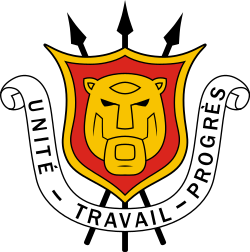 |
|---|
The Council of Ministers of Burundi are the senior level of the executive branch of Burundi and consists of the Prime Minister of Burundi and various Ministers. The 2018 constitution, which enshrines ethnically based power-sharing, requires that at most 60% of ministers come from the ethnic Hutu majority and at most 40% hail from the Tutsi minority. At least 30% of government ministers must be women. [1] The members of the council are directly appointed by the President in consultation with the Vice-President and Prime minister. [2]
Contents
- Current members of the government
- Members of the Government named in 2010
- Members of the government named in 2007
- See also
- References
The current council of ministers commenced on 8 September 2024 and is President Évariste Ndayishimiye's second cabinet (with a couple of minister changed of the course of 2024). [3]